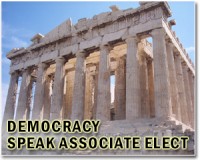 |
Port-Au-Prince (AFP) Jan 16, 2011 The tears have barely dried from Haiti's earthquake anniversary and now the deeply troubled Caribbean country faces the urgent task this week of defusing an explosive election crisis. Sunday was supposed to have been the day Haitians voted in a runoff to chose a new president to lead them through the most challenging period in their history. However, the runoff was postponed after the first round ended in bitter dispute. Instead, candidates, election officials, the government and international experts were spending the weekend debating which candidates should even appear on the ballot. At the center of the debate is a set of recommendations from the Organization of American States, a regional body, that was handed to President Rene Preval on Thursday. The report has yet to be published but a leaked copy revealed that the OAS is pushing for Preval's preferred candidate, Jude Celestin, to drop from the race. According to the OAS, Celestin's vote tally in a chaotic first round of the election in November was padded by fraud so that in reality he placed not second, but only third. Reshuffling the results would put his rival Michel Martelly, a popular singer, into second place to challenge Mirlande Manigat in the runoff. Manigat, a former first lady, garnered 31 percent of the vote among 19 candidates in the first round. Accepting this is thought to be difficult for Preval, who had hoped to see an ally take over his job. In Haiti's turbulent, often deadly politics, an ex-president needs all the security guarantees he can get. International pressure is mounting on Preval to back the OAS recommendations and for Celestin to quit. "Now it's time to recognize the consequences of the definitive results of the first round of voting so that they reflect the choice expressed by voters," French Foreign Ministry spokesman Bernard Valero said. But in a country with a long history of dictators, coups, and bloody street protests, the will of the voters is easily drowned out. Only hours after the OAS report had been handed in, armed men clashed with police and set fire to gasoline-drenched tires in several parts of the capital Port-au-Prince. Although order was quickly restored, the unrest served as a warning. The coming week could prove pivotal. The head of the OAS mission, Colin Granderson, said talks between monitors and the government "will wrap up early next week and the report will be published at that time." Once the government has finished with the report, it will be passed to the Provisional Electoral Council, which has the authority to decide which candidate -- Celestin or Martelly -- will face Manigat in the runoff. "The CEP should receive this report very shortly," Councilor Ginette Cherubin told Le Nouvelliste newspaper Saturday. In a long interview, she gave little indication of the council's position. "The electoral institution will certainly take these recommendations into account," she said. "How much -- all or just partly? That will only be possible to say after the analysis." Cherubin said "the CEP is under pressure to find an adequate response." But in an indication of the defensiveness of Haitian officials in this tense period, she lashed out at "certain foreign partners" for making statements that were "very provocative and with strong neo-colonialist overtones." The task facing the next president is unenviable. Haiti's economy and infrastructure, already in tatters before last year's earthquake, are in desperate condition. Haiti is the poorest country in the Western Hemisphere with 80 percent of its population living in poverty. The Haitian government estimates that 300,000 people died in the earthquake last January. More than three quarters of a million people still live in tent camps after losing their homes, a deadly cholera outbreak has yet to be brought under control, and an entire generation of children faces a deep crisis in education.
Share This Article With Planet Earth
Related Links Democracy in the 21st century at TerraDaily.com
 Marine Le Pen: new face of French far right
Marine Le Pen: new face of French far rightTours, France (AFP) Jan 16, 2011 As well as daughter of the French National Front's founder, Marine Le Pen is also a seasoned politician who hopes, as its new leader, to polish the image of a party seen as racist. Le Pen has angered traditionalists who saw her as an upstart benefiting from her father's position. But she has won her political spurs, and on Sunday was officially named his successor as the leader of the Nation ... read more |
|
| The content herein, unless otherwise known to be public domain, are Copyright 1995-2010 - SpaceDaily. AFP and UPI Wire Stories are copyright Agence France-Presse and United Press International. ESA Portal Reports are copyright European Space Agency. All NASA sourced material is public domain. Additional copyrights may apply in whole or part to other bona fide parties. Advertising does not imply endorsement,agreement or approval of any opinions, statements or information provided by SpaceDaily on any Web page published or hosted by SpaceDaily. Privacy Statement |